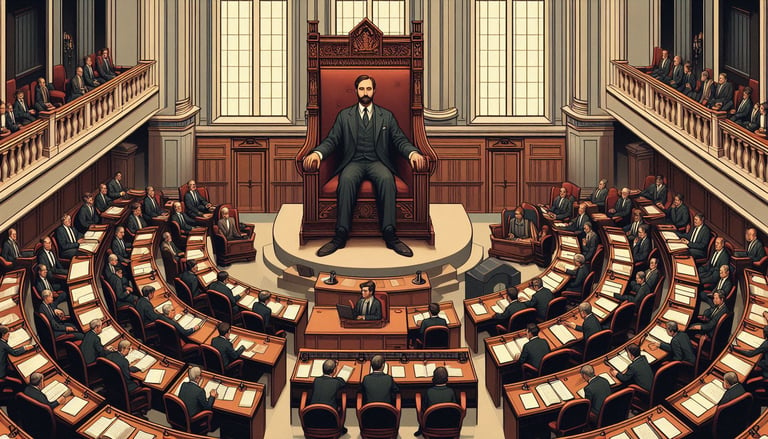Kihoto Hollohan v. Zachilhu
Shubhi Singh
Chhatrapati Shahu Ji Maharaj University, Kanpur
This Blog is written by Shubhi Singh, a Fourth-Year Law Student of Chhatrapati Shahu Ji Maharaj University, Kanpur


CASE DETAILS:
COURT–SUPREME COURT OF INDIA
EQUIVALENT CITATION – 1992 SCR (1) 686, 1992 SCC SUPL. (2) 651
[BEFORE THE BENCH OF: SHARMA, L.M. (J), VENKATACHALLIAH, M.N. (J), VERMA, JAGDISH SARAN (J), REDDY, K. JAYACHANDRA (J), AGRAWAL, S.C. (J)]
PARTIES –
· APPELLANT- KIHOTO HOLLOHON
· RESPONDENT- ZACHILHU AND ORS
DECIDED ON 18 FEBRUARY, 1992
INTRODUCTION
The case of Kihoto Hollohan v. Zachilhu (1992) is significant in the context of Indian constitutional law, particularly regarding the powers of the Speaker of the Legislative Assembly and the disqualification of members under the Tenth Schedule of the Constitution. India witnessed a huge surge in this evil phenomenon in the late 1960s. At a point, it became more than necessary that the country has anti-defection legislation, and our legislators brought forth a schedule to deal with the issue. This case is considered a landmark verdict as it delves into the constitutional validity of the Tenth Schedule of the Indian Constitution, which was introduced via the Constitution (Fifty-Second) Amendment Act, 1985.
FACTS
In this situation, many applications were heard at the same time.
In the case of Kihota Hollohon v. Zachilhu and Ors, the validity of the Tenth Schedule established by the Constitution (Fifty-Second Amendment) Act, 1985 was questioned. The Constitution (Fifty-second Amendment) Act replaced four articles of the Constitution with the tenth schedule, namely 101(3)(a), 102(2), 190(3)(a).
In a 3:2 decision, the Supreme Court confirmed the Anti-Defection Law's constitutional constitutionality. The majority was made up of Justices M.N. Venkatachaliah, K.J. Reddy, and S.C. Agrawal, while the minority was made up of Justices L.M. Sharma and J.S. Verma.
At the same time, the Supreme Court determined that the speaker's orders under the legislation prohibiting an MLA from serving due to defection are subject to Judicial Review.
ISSUES
Is it true that the Speaker should have such broad powers only if there is always a reasonable chance of prejudice?
Are the modifications to the 52nd Amendment constitutionally valid?
Whether or not Judicial Review is available before a decision is made by the Speaker/Chairman.
Does Judicial Review apply to the Rules outlined in the tenth schedule?
CONTENTIONS BY THE PARTIES
Petitioner:
· The petitioner argued that Chapter IV of Part V (Supreme Court) and Chapter V of Part VI (High Court) are altered by Paragraph 7 of the Tenth Schedule, which removes the Supreme Court’s authority under Article 136 and the High Court’s jurisdiction under Article 226,227. Therefore, by Article 368, before an amendment is submitted to the President for approval, it must be approved by the legislatures of at least half of the states.
· In addition, the petitioner argued that paragraph 7 of the Tenth schedule eliminates the ability for judicial review because it prevents a disqualified member from appealing a decision made by the Speaker or Chairmen to the High Court or Supreme Court.
· The petitioner further claimed that the idea of disqualification for defection violates the fundamental principles and values of parliamentary democracy, as well as the rights to free speech, dissent, and conscience of elected officials and that it undermines a fundamental aspect of the Constitution.
· A further argument presented to the court was that there was a breach of the fundamental characteristic as democratic processes require independent adjudicating bodies to settle electoral disputes.
Respondent:
· The Respondent argued that Articles 122 and 212, which forbid the court from looking into parliamentary processes, negate the court’s jurisdiction under paragraph 7.
· The respondent went on to say that there would be no need for judicial review because the Speaker/Chairman, who is using their authority under Paragraph 6(1) of the Tenth Schedule, works as a member of the state’s legislative department rather than as a statutory tribunal.
SUPREME COURT’S JUDGMENT
The Supreme Court held that :
· Authority of the Speaker: The Speaker has the authority to disqualify members, but this power must be exercised in a fair and non-partisan manner. The Court emphasized that the Speaker’s role is quasi-judicial and must adhere to principles of natural justice.
· Judicial Review: While the Speaker's decisions are generally not subject to judicial review, the Court affirmed that the High Court could intervene if there was a clear violation of principles of natural justice or if the decision was arbitrary or mala fide.
· Constitutional Safeguards: The judgment reinforced the importance of protecting democratic processes and preventing the misuse of power by political actors, thereby maintaining the integrity of the legislative framework.
· The Election Commission took a similar stand, citing the views of Justices L.M. Sharma and J.S. Verma. It made recommendations and suggested in 1977 that defection-related disqualifications be submitted to the Election Commission for a view to be extended to the President or Governor, as the circumstance may be, and that the President or Governor act on the Election Commission’s similar opinion, just like with other disqualifications about articles 102 and 191 of the constitution.
· In Kihoto Hollohan v. Zachillhu, it was argued that the rights to conscience, dissent, and free speech are violated by the anti-defection act. The Supreme Court decided that the goal of the statute is to deal with unprincipled defections, which are not covered by the rights to intellectual freedom, dissent, or freedom of conscience. As a result, this law has certain dysfunctional effects, yet it is required in the modern day because combating political corruption is a crucial component of democratic reforms.
CONCLUSION
Kihoto Hollohan v. Zachilhu remains a landmark judgment in Indian constitutional law, highlighting the critical interplay between legislative authority and judicial review. It stresses the importance of upholding democratic values and protecting individual rights within the framework of legislative processes.
REFERENCES
· Kihoto Hollohan vs Zachillhu And Others on 18 February, 1992;1992 SCR (1) 686, 1992 SCC SUPL. (2) 651 (https://indiankanoon.org/doc/1686885/)
· https://blog.ipleaders.in/kihoto-hollohan-vs-zachillhu-1993/
· https://www.studocu.com/in/document/karnatak-university/family-law/document-lecture-notes-1/16649110
